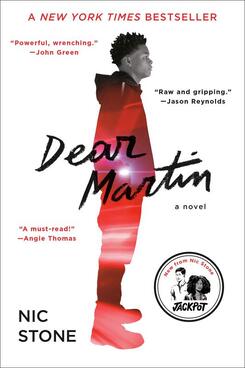| We are pleased to welcome Dr. Kristen Hawley Turner for today's Monday Motivator. A professor of teacher education and program director at Drew University, Kristen maintains a personal blog, is the founder and director of the Digital Literacies Collaborative and serves as an editor for Teachers, Profs, Parents: Writers Who Care. Kristen's author page can be found here. I (Gretchen) have appreciated Kristen's creativity, insight, and strength; her perspective as both a parent and a professor is especially valuable when considering students' right to read. All of us must practice vigilance in the face of today's book challenges. Thank you, Kristen, for motivating us. |
It’s Monday, and it’s time to get motivated!
Yea, right. It’s hard to get motivated to do much of anything anymore. Educators have been inundated with complaints, anger, and vitriol lately. Whether you have experienced it personally or watched it through your feed, you feel it. As teachers, we have the expertise to be strong advocates for our profession and for our students, but it is hard to stand up in your community.
Censorship is not new, but it seems that this time around the "conversation" about curriculum is particularly brutal. Recently, parents have been harassing school board members, administrators, and teachers with complaints about everything from sex education to Critical Race Theory. When parents attended my local school board meeting last month to call for the exclusion of Dear Martin (Nic Stone), I knew I had to speak up. I had to find the energy to put my thoughts together and the conviction to share them publicly. I hope that my letter to my local school board inspires you to keep advocating for your students and yourselves as experts in your field.
It doesn't matter what completes the "In support of..." stem that I used in the title of this post. We know what is right, and we, as trained professionals, can stand for it.
Dear Members of the Board of Education:
I understand that at the recent Board of Education meeting, parents raised concerns about the inclusion of Dear Martin in the ninth grade English curriculum. I would like to voice my support for both this text and the educators who selected it.
Dear Martin is a coming-of-age novel. In the same way that classics like The Adventures of Huckleberry Finn, To Kill a Mockingbird, A Separate Peace, and The Catcher in the Rye depict characters who encounter life’s challenges, develop their identities, and grow into adult perspectives, Dear Martin offers teen readers the story of an adolescent. A primary difference between Dear Martin and the other texts I listed here is that the main character in Dear Martin is Black, and the book documents his perspective. The others all showcase White characters and perspectives.
In terms of content, Dear Martin is the story of a Black teenager who deals with typical adolescent questions. He navigates teenage angst by writing letters in a journal to Martin Luther King, Jr., drawing strength and guidance from his understanding of this historical figure. He has to decide whether to stay in a bad relationship with the prettiest girl in school or to admit that he has feelings for his best friend, a girl that his mother would not approve of. He needs to decide if he wants to go down a path with a group of friends who will likely get him into trouble. He struggles to understand himself and to stand up for what he believes.
These timeless themes can be seen in texts we all likely have read in school - Romeo and Juliet, The Outsiders, Lord of the Flies. What the field of literacy education has learned since we read these “classics,” however, is that young adult literature that deals with contemporary issues where adolescents can imagine their own or others’ lives better engages teen readers than do stories that seem out-of-date to them.
Furthermore, literature can offer both “mirrors” where students can see themselves represented in the curriculum, community, and society at large and “windows” where students have the opportunity to look beyond their own experiences to understand the experiences of others. It is important for all students to have opportunities both to see themselves and to view the perspectives of others.
When I watched the Back to School night video for ninth grade English, I was very pleased to see that multiple perspectives were offered to ninth graders in the district. The district should be commended for including authors such as Steinbeck, Lee, Hansberry, Satrapi, Tan, Weisel, Shakespeare, Stone, as well as traditional myths like the Odyssey. These texts span a range of eras, geographical origin, and cultural perspectives. It is through talking about stories and grappling with the issues that characters/people face that teens learn about both themselves and others.
By reading a range of texts, ninth graders will be encouraged to think critically about the world in which we live, to identify problems to be solved and to develop solutions to address these issues. This process is in line with the mission of the IB World School.
Dear Martin, written by a Black author and showcasing the perspective of a Black character, is an important text in the list above. It is one of the only truly contemporary selections, where the author is both still living and still publishing regularly. It also reflects issues of society that our teens face every time they log onto the internet. By depicting the story of a young Black man who is unnecessarily arrested, the book offers access points for discussion about real-life news stories, all while connecting to the important history of the United States and the Civil Rights leader, Martin Luther King, Jr. All of the characters in the book, regardless of the identities they hold - White, Black, Jewish, Affluent, Working Class, Teen, Adult - confront, discuss, grapple with, and grow from the events in the story that parallel contemporary news stories regarding #Blacklivesmatter, racial unrest, discrimination, language use, and other socially important topics. Opening a space to discuss these very real issues in the context of a fictional story provides opportunities for dialogue among peers that can lead to deepened appreciation for the experience of others, also a hallmark of the IB Learner Profile.
It is important to note that approximately 18% of the district's student body identifies as non-White according to the latest demographic data available from the state. Including texts that provide both mirrors for and windows into the experiences of people of color should be a district imperative in order to meet the goals of being an IB district, and, perhaps more importantly, to be responsive to the needs and identities of all students in the district.
In closing, I want to address the concept of Critical Race Theory (CRT) that has been raised in conjunction with Dear Martin. CRT is a theoretical framework that is taught in graduate schools as a lens through which to view societal, economic, and political structures. It is explicitly taught as a theory in the same ways that other philosophical, social, and economic theories are taught at the advanced levels.
CRT is not taught by reading a young adult novel or discussing the history of race and racism in the United States. Inclusion of all learners and respect for individual identities is also not CRT. CRT is unrelated to Dear Martin as it pertains to the ninth grade curriculum. Rather, the journaling, discussion, and sharing that students did during the unit helped them to (1) consider their own opinions and the perspectives of others, (2) reflect on some prominent contemporary issues in society, and (3) develop as readers and writers. In this way, the choice of this text is in line with the IB Learner Profile and World School Mission.
The educators in the district are well-trained and highly qualified. They deserve our respect in making choices that serve all students. I support their decision to include Dear Martin, and I would be very disappointed to see any censorship of this book from the curriculum.
Sincerely,
Kristen Hawley Turner, PhD
Parent of Twin 9th Graders




 RSS Feed
RSS Feed